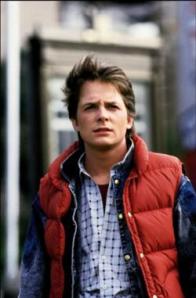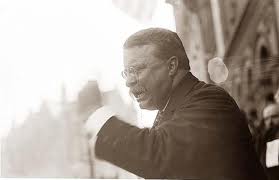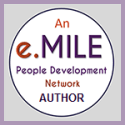Rivers of Thought
Life, Leadership, Business & Technology
OK, before you movie buffs tell me “Marty McFly never met Theodore Roosevelt, much less paddle a river with anyone!” Keep your pants on for a minute, I can explain.
 For those of you who have lived in a cave for the last 25 years, Marty McFly is the lead character in the movie trilogy “Back to the Future”. Marty is transported back in time in a Delorean from 1985 to 1955. (Holy crap, do you realize in Back to the Future II, Marty travels 30 years into the future to 2015, that, my friends, is less than six months away!) While in 1955, Marty changes the course of history and his life, by inadvertently preventing his mom and dad from having their first kiss, and interrupting their density (sic). He then spends the rest of the movie trying to fix history before (his) time runs out.
For those of you who have lived in a cave for the last 25 years, Marty McFly is the lead character in the movie trilogy “Back to the Future”. Marty is transported back in time in a Delorean from 1985 to 1955. (Holy crap, do you realize in Back to the Future II, Marty travels 30 years into the future to 2015, that, my friends, is less than six months away!) While in 1955, Marty changes the course of history and his life, by inadvertently preventing his mom and dad from having their first kiss, and interrupting their density (sic). He then spends the rest of the movie trying to fix history before (his) time runs out.
That moment, that kiss, was an “event angle”, a moment in time where you and you alone stand at a crossroads, faced with a decision, life will be dramatically different depending on the choice you make at that moment. Even without Marty’s intercession, George could have chickened out and never kissed Lorraine. Lorraine could have slapped him for an unwanted advance. We are all faced with these “event angles” in our lives, major decision points that present themselves to us. This might be a marriage, a divorce, birth of a child, death of spouse, a new job, or perhaps a termination from a job. The decisions we make at these times say a lot about who we are as people, and who we are as leaders.
Teddy Roosevelt was faced with such an “event angle” in 1912 (no it did not involve a kiss!). He had just lost the presidential election to Woodrow Wilson (by a large margin I might add). He was quoted as saying that defeat was either Bull Run or Waterloo, only time would tell. Interesting choice of words. Bull Run one of the earliest battles of the Civil War and Waterloo, the war that brought an end to Napoleon’s rein. Two diverging meanings. The beginning of a long struggle, or the end of power. I think the most telling part of Roosevelt’s quote, was “only time will tell”. He was giving up, he was leaving it up to fate. Gone was the bravado he was so famous for exhibiting, he was…defeated.
Like so many “event angles” in life, Roosevelt had put himself in this position by conscious decisions. He had left the presidency

Theodore Roosevelt and William Howard Taft, 1912 Credit: Topical Press Agency/Hulton Archive/Getty Images
in 1908. Taft, his chosen successor, had won the election. Roosevelt, now an international rock star went on an extended tour of Europe. Taft, however, was not Roosevelt. Roosevelt began to disagree publicly with Taft’s policies. As election time drew near, he began to contemplate another presidential run, eventually throwing his hat in the ring for the Republican Nomination and destroying his friendship with Taft in the process. Taft prevailed. Roosevelt could have seen the signs, instead he chose to run as a 3rd party candidate, in essence splitting the vote and giving the election to Wilson. Couldn’t he see this coming? Didn’t he see his popularity had waned during his European Tour? Was he so filled with hubris that he felt he could not be beat? And, what of his relationship with Taft. They had been very close. They would never speak again.
What can we learn from Roosevelt? What can learn from McFly? Many times in life, we will find ourselves at a crossroads, at an “event angle”. Rarely does life put us there at random. Usually we are there because of decisions and actions we made previously. While we cannot predict the future, we should consider the future consequences when plotting our courses. Had Marty not gone to meet Doc in 1985, he would not have been transported back to 1955 and changed the course of history. Had Roosevelt not decided to run for another term, he would not have destroyed his friendship, Wilson might not have won the election, and who knows the impact Roosevelt could have had in Europe as the world plummeted towards war.
We must also recognize “event angles” for what they are, major decisions that will change the course of our businesses and even our lives. We cannot do as Roosevelt did and “let time tell”. What if Roosevelt had seen this loss as an opportunity, dare I say, a victory? When we are faced with “event angles”, we can choose the way those decisions impact us. Even if the “event angle” is forced up us by life (divorce, death of a loved one, termination of a job), we can choose how we react to those events. We can take the path of Roosevelt and give up in the face of defeat, or we can choose to live on, lead on, and to make an impact.
Now, if you will excuse me, I’m going to grab some popcorn, my best gal and watch “Back to the Future”…again!
#RooseveltRiver is my year long exploration with Dan Miller of Historical Solutions into leadership using the backdrop of history and the life of Theodore Roosevelt. To read more in this series, select “Roosevelt River” from the Category drop down on the right.
If anything you read here or in other posts strikes a chord, I would love to hear from you. Leave a comment, hit me up on Twitter (@jtongici), find me on LinkedIn, or Google +.
 Thinking back, I am not sure what I expected. I had been asked to represent the executive staff by speaking at the graduation ceremonies for one of our high schools (didn’t know Goodwill Indy had high schools, did you?). I was flattered to have been asked, but really had no idea what to say. This was not an ordinary high school, this was a school for adults who had dropped out for one reason or another, but who now wanted to come back and complete their high school diploma, not just earn a G.E.D. I would be speaking at The Excel Center – Anderson. What could I possibly say that would be meaningful to them? Would their families come to watch? My own graduation was over 35 years ago, what connection would I have to them? I didn’t realize I was about to be blown away!
Thinking back, I am not sure what I expected. I had been asked to represent the executive staff by speaking at the graduation ceremonies for one of our high schools (didn’t know Goodwill Indy had high schools, did you?). I was flattered to have been asked, but really had no idea what to say. This was not an ordinary high school, this was a school for adults who had dropped out for one reason or another, but who now wanted to come back and complete their high school diploma, not just earn a G.E.D. I would be speaking at The Excel Center – Anderson. What could I possibly say that would be meaningful to them? Would their families come to watch? My own graduation was over 35 years ago, what connection would I have to them? I didn’t realize I was about to be blown away!
I arrived early (wouldn’t want to be late) so I sat in my car and worked a bit (OK, I read email, but hey that IS my work!). I was stunned, as car after car pulled into the lot. I walked inside to find the place packed with friends and family. The students were busy putting on the caps and gowns. I was immediately struck by their genuine excitement (some nervous excitement maybe), their closeness to each other, and their closeness to the faculty. The mood was one of celebration and it was contagious!
I donned my robe and took my place next to the school’s director (principal) as we processed in. As the graduates walked down the aisles (making a pass down each aisle so friends and family could see their graduate) the excitement built as cameras (ok cell phones) flashed. Sitting in the front on the stage, I could see the faces of husbands, wives, parents and children of the graduates, already I was choking back tears.
Three graduates had been selected to speak. I can’t begin to do their stories justice. One was a woman who had dropped out twenty-three years prior. She wanted to come back, now years later, to get her diploma to be a role model for her kids. Another was a young man who had struggled in traditional school and had been tagged “special needs”. He was now graduating with several certifications and heading off to college. The third was a young lady whose best friend had been murdered, the depression and confusion this brought into her life destroyed her high school career. She had come back to earn her diploma to honor her friend. Amazing stories! My guess is, the other 53 graduates’ stories were just as amazing!
You can read their stories hear: Laura, Isaac, Sarah.
How could I possibly follow THAT? A few days before the event, I had come to the realization (kind of a duh moment) that no one was there to hear me speak. They were all there for them, for the graduates. Keep it short, keep it simple.
I am truly honored to be here tonight representing the Goodwill family on such a special occasion. We, your friends and family, your teachers and faculty, and Anderson community leaders are here to celebrate with you.
To the community leaders of Anderson, I want to say thank you. Thank you for the partnership and the vision that lead to the opening of the Anderson Excel Center just two short years ago. Your support of the Excel Center has enabled them, the third graduating class, to achieve what otherwise might have been un-achievable.
To the teachers and administrators, I want to say thank you. Thank you for the dedication and caring that enabled you to teach, inspire and change lives. What you do is incredibly difficult, and yet so incredibly important. I and the rest of the 3,000 employees of Goodwill are honored to be your colleagues. Your work here has been nothing short of amazing.
To the friends and families of our graduates who are here tonight, I want to say thank you. Thank you for being here to celebrate with your graduate. Thank you for the support you have shown as they attended classes, did homework, and studied. I am sure it was not always easy, nor convenient. They are here in front of you today due in part to your support.
To the graduates, I want to say thank you. Thank you for allowing us to join in your celebration. Your lives have been forever changed. Each of you has a story, a story of roadblocks and obstacles. But tonight, you have added a chapter to that story, a chapter of perseverance, of fortitude, of overcoming those roadblocks and obstacles. Whether your next step is a career, or you plan to go on to college, you have accomplished something tremendous. You can say, proudly, “I am a graduate! Thank you for sharing your story with us, thank you for sharing your moment with us. Thank you for changing our lives as well.
As each student received their diploma, I had the honor of shaking their hand. Each one of them looked me in the eye,  proudly. As I congratulated each of them, tears continued to well up. This is why we do what we do, this is why I do what I do, for those 56 new high school graduates that are ready to take on the world!
proudly. As I congratulated each of them, tears continued to well up. This is why we do what we do, this is why I do what I do, for those 56 new high school graduates that are ready to take on the world!
To see pictures of that night at The Excel Center – Anderson, or the other Excel Center graduations check out the photo album. To learn more about The Excel Centers visit our website at: The Excel Center.
If anything you read here or in other posts strikes a chord, I would love to hear from you. Leave a comment, hit me up on Twitter (@jtongici), find me on LinkedIn, or Google +.
 A couple years ago I wrote a short eBook titled “Everything I Learned about Leadership…I Learned from Lewis and Clark“. Well, guess what? It was a lie! As the dedication in the book declares, I really learned about leadership from my dad! Dad spent the majority of his career as an American Baptist minister, later taking roles in denomination leadership. What this meant was, that as a kid, I spent a LOT of time in church and a LOT of time listening to him preach. Think about it…18 years, give or take…Sunday morning service, Sunday night service, Wednesday service…and all the special services like Maundy Thursday, Good Friday, and Christmas Eve. A conservative estimate says it was over 2,000 sermons!
A couple years ago I wrote a short eBook titled “Everything I Learned about Leadership…I Learned from Lewis and Clark“. Well, guess what? It was a lie! As the dedication in the book declares, I really learned about leadership from my dad! Dad spent the majority of his career as an American Baptist minister, later taking roles in denomination leadership. What this meant was, that as a kid, I spent a LOT of time in church and a LOT of time listening to him preach. Think about it…18 years, give or take…Sunday morning service, Sunday night service, Wednesday service…and all the special services like Maundy Thursday, Good Friday, and Christmas Eve. A conservative estimate says it was over 2,000 sermons!
Today, almost 40 years since he was last my pastor and probably 10 to 15 years since I have heard him preach, I can remember many (ok not all 2,000, but many) of them. Why? or better yet, how? I can’t remember what I had for breakfast this morning, but I can remember the time he had one of the drollest members of the congregation walk up and eat an apple, leaving the core on the alter during “pledge” Sunday, or when some of the youth stood up and questioned him in the middle of a sermon (planned as a part of youth Sunday of course), or the many times, he would take on a persona of a character from the bible…Peter and Paul being the most memorable or the old lady who proclaimed “You ain’t e’er gonna shroud that light, eer ya?” as an adult lesson of the children’s song “This Little Light of Mine”, or , or even the time he stopped mid-sentence and asked my mother to go to his office and get the copy of his sermon because he’d lost his train of thought and his notes weren’t helping (he STILL says this was not planned).
Why do I remember them? I can hear you saying, “Oh sure, you remember those, they had memorable moments, something that set them apart”. Of course they did, I guess that’s the point. He was (is) a master at creating a visualization through a gesture or an action, some way of saying “This is important! Pay attention!” When he got out from behind the podium, I would (the whole congregation would) sit up and take notice. It was the energy and forcefulness (not in a hell-fire and brimstone sort of way, mind you), but in a way to capture all of our senses. It might have been as simple as pacing across the front of the church, or as in the examples above something even more captivating. As I reflect on this now, my guess is many of the gestures just became a natural part of his delivery when he wanted to make a point, still others were very rehearsed and planned.
Like my dad, Roosevelt was a master at making a point through a gesture. Do an image search on Google for theodore  roosevelt speaking and you will find hundreds of pictures but you would be very hard pressed to find any of him standing still behind a lectern. You will see him teeth bared, leaning forward, fist pounding in hand, or arms spread wide. Some of these were very much thought out, others were as natural to him as speaking itself. The audience was captivated, he was talking with them (not TO them), he was their voice. Roosevelt once declared “I’m am not public opinion, I am the public”, a bold statement certainly, but at the height of his presidency he was absolutely correct.
roosevelt speaking and you will find hundreds of pictures but you would be very hard pressed to find any of him standing still behind a lectern. You will see him teeth bared, leaning forward, fist pounding in hand, or arms spread wide. Some of these were very much thought out, others were as natural to him as speaking itself. The audience was captivated, he was talking with them (not TO them), he was their voice. Roosevelt once declared “I’m am not public opinion, I am the public”, a bold statement certainly, but at the height of his presidency he was absolutely correct.
For me, I inherited my dad’s propensity to wander away from the lectern to make a point, to engage with my listeners. Even during my monthly staff meetings I stand so I can move around. During my exploration of #RooseveltRiver, Dan challenged me to think about times or messages when I should break from the natural, instinctive gestures to make the point even more impactful. Recently, I had the distinct privilege to speak at a high school graduation (future post alert!) as I thought about my words and my delivery, I realized this was one of the times Dan was referring to. What I said was irrelevant. It was not about the message. It was about the graduates, their families and their celebration. I delivered my short remarks passionately, yet standing still behind the lectern. Think about your own delivery. How do you emphasize your points? When you are presenting to your team, the board or a larger audience is your point made by some instinctive gesture? Do you rehearse and plan your gestures? Sometimes the natural, instinctive gestures are the most powerful, however, there are other times that may call for a more intentional, rehearsed gesture, or even times when no gesture at all is the course of the day.
#RooseveltRiver is my year long exploration with Dan Miller of Historical Solutions into leadership using the backdrop of history and the life of Theodore Roosevelt. To read more in this series, select “Roosevelt River” from the Category drop down on the right.
If anything you read here or in other posts strikes a chord, I would love to hear from you. Leave a comment, hit me up on Twitter (@jtongici), find me on LinkedIn, or Google +.

Insights is the weekly, thought-provoking newsletter from Jeffrey S. Ton.
Every Tuesday – Delivered to your inbox.
A different focus each week:
Leadership Thought – A lesson-learned, an insight shared
Leadership Q&A – A response to a reader’s or a connection’s question
Leadership Spotlight – A highlight of a person or company helping others to grow their leadership
Rivers of Thought – A more personal thought, observation or musing



